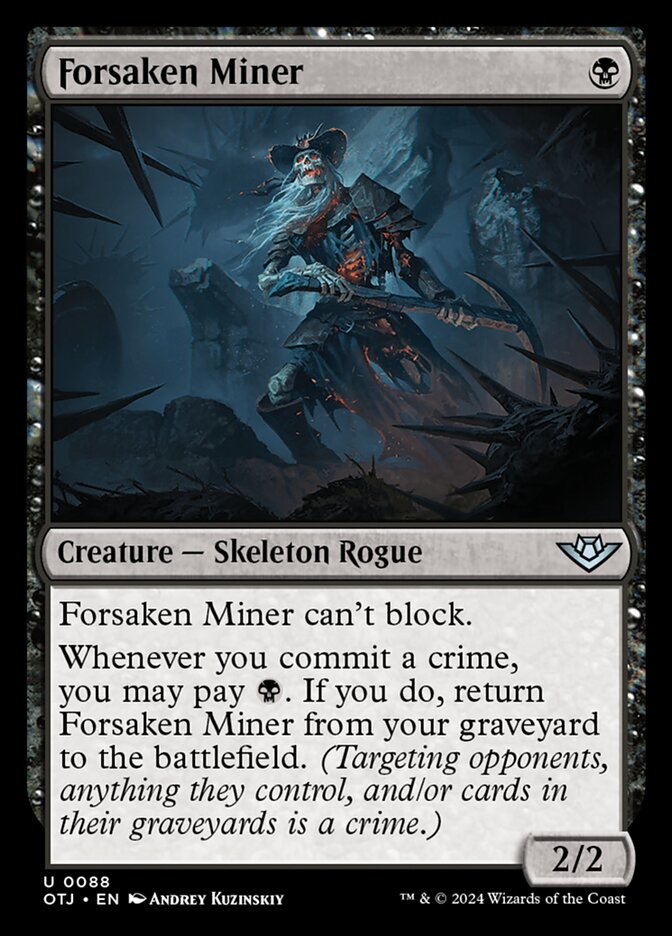
Forsaken Miner {B}
Creature — Skeleton Rogue
Forsaken Miner can’t block.
Whenever you commit a crime, you may pay {B}. If you do, return Forsaken Miner from your graveyard to the battlefield. (Targeting opponents, anything they control, and/or cards in their graveyards is a crime.)
2/2
Illustrated by Andrey Kuzinskiy
- Standard
- Legal
- Alchemy
- Legal
- Pioneer
- Legal
- Explorer
- Legal
- Modern
- Legal
- Historic
- Legal
- Legacy
- Legal
- Brawl
- Legal
- Vintage
- Legal
- Timeless
- Legal
- Commander
- Legal
- Pauper
- Not Legal
- Oathbreaker
- Legal
- Penny
- Not Legal
Toolbox
Buy This Card
Notes and Rules Information for Forsaken Miner:
- Forsaken Miner’s last ability triggers only if Forsaken Miner is in your graveyard at the moment you cast a spell, activate an ability, or put a triggered ability on the stack with one or more targets that constitute a crime. For example, if you cast a sorcery spell that destroyed two target creatures and your targets were a creature controlled by an opponent and Forsaken Miner, Forsaken Miner’s ability won’t trigger. However, if you cast a spell with an additional cost of “Sacrifice a creature” and you sacrifice Forsaken Miner to pay that cost, Forsaken Miner’s ability will trigger as long as you committed a crime with that spell. (2024-04-12)
- You choose whether to pay {B} as the triggered ability is resolving. Once the ability starts resolving, it’s too late for anyone to respond by removing Forsaken Miner from your graveyard to stop you from bringing it back. (2024-04-12)
- A player commits a crime as they cast a spell, activate an ability, or put a triggered ability on the stack that targets at least one opponent, at least one permanent, spell, or ability an opponent controls, and/or at least one card in an opponent’s graveyard. (2024-04-12)
- The spell or ability that constituted a crime doesn’t have to have resolved yet or at all. As soon as you’re finished casting the spell, activating the ability, or putting the triggered ability on the stack, you’ve committed a crime. (2024-04-12)
- For example, an ability that triggers when you cast a spell that targets an opponent will trigger at the same time as an ability that triggers whenever you commit a crime. Those abilities can be put on the stack in either order (if you control them both), and they’ll both resolve before the spell that caused them to trigger. (2024-04-12)
- A player can commit only one crime per spell or ability they control. Targeting multiple opponents, permanents, spells, abilities, and/or cards with the same spell or ability doesn’t constitute committing multiple crimes. (2024-04-12)
- Changing the target or targets of a spell or ability won’t affect whether or not the controller of that spell or ability has committed a crime. Only the initial targets chosen for that spell or ability are used to determine whether or not its controller committed a crime. (2024-04-12)